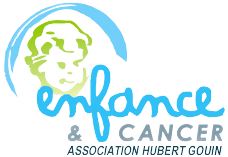Le Comité Scientifique
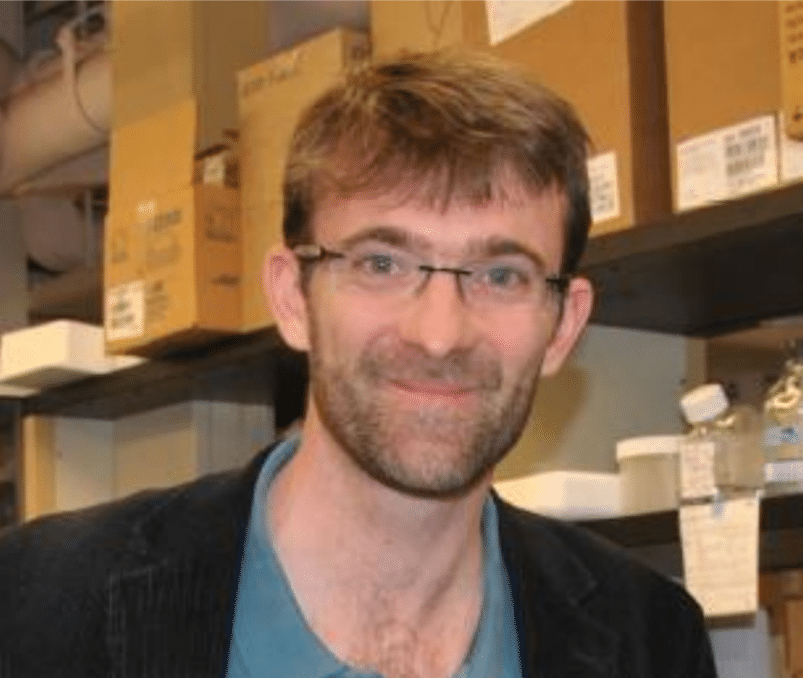
Dr Franck Bourdeaut
Président actuel depuis décembre 2020
Pédiatre Oncologue à l’institut Curie depuis 2010
franck.bourdeaut@curie.fr
Le Dr Franck Bourdeaut est pédiatre oncologue, travaillant à l’Institut Curie depuis 2010. Après une formation clinique, Franck Bourdeaut a réalisé une thèse dans le laboratoire d’Olivier Delattre consacrée aux liens entre le développement normal du système nerveux sympathique et le neuroblastome.
Son travail a en particulier contribué à identifier les premiers facteurs de prédisposition génétique au neuroblastome. Il a par la suite continué de porter un intérêt aux facteurs de prédisposition génétique aux cancers de l’enfant, en particulier pour les neuroblastomes et les tumeurs rhabdoïdes ; ces travaux l’ont amené à initier, avec le Dr Laurence Brugières de Gustave Roussy, le groupe de travail national, et désormais européen, consacrée aux prédispositions génétiques aux cancers de l’enfant.
Depuis 2012, il co-dirige avec le Dr Schleiermacher, l’équipe de Recherche Translationnelle en Oncologie pédiatriquie, au sein de l’unité INSRM U830 dirigée par le Dr olivier Delattre ; son travail de recherche en laboratoire actuellement porte sur les tumeurs embryonnaires du cerveau, en particulier les tumeurs rhabdoïdes et les médullobastomes. Le Dr Franck Bourdeaut est membre du conseil scientifique de la SFCE depuis 2015.
Les membres du conseil scientifique
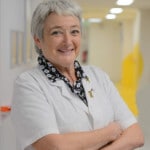
Dominique VALTEAU-COUANET
Onco-pédiatre et médecin des CLCC depuis 1992 dans le département de cancérologie de l’enfant et de l’adolescent de Gustave Roussy.
Initialement en charge de l’unité de greffe du département je suis le chef du département depuis 2008.
Je suis membre du comité de direction de Gustave Roussy depuis février 2020.
J’ai travaillé principalement sur les protocoles de chimiothérapie à hautes doses dans les tumeurs de haut risque et sur les protocoles des Neuroblastomes de Haut risque pour lesquels je suis la coordinatrice au niveau européen de 2 protocoles européens (HR NBL2 et VERITAS).
Très impliquée dans le fonctionnement de la SFCE, j’ai été notamment présidente de son conseil scientifique de 2015 à 2019.
Je suis représentante de la SFCE dans le collectif GRAVIR
Je suis membre fondateur du groupe européen des neuroblastomes SIOPEN et en ai été présidente de 2013 à 2019, je suis maintenant dans l’advisory board
Complètement hors sujet , j’ai créé le comité d’éthique de Gustave Roussy en 2011 et en ai été présidente pendant les 3 premières années .
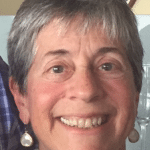
Katherine-K-MATTHAY
Mildred V. Strouss Professor of Translational Oncology University of California San Francisco
Dr. Katherine Matthay is internationally known for her work in advancing therapy of neuroblastoma. She served as North American continental president for the International Society of Pediatric Oncology, and as president of the Advances in Neuroblastoma Research Association.
She has chaired the neuroblastoma committee in the Children’s Oncology Group (COG) and currently continues to serve as senior advisor. She initiated several landmark randomized trials in neuroblastoma in the COG, improving outcome with high dose therapy and bone marrow transplant and with isotretinoin and then with antibody therapies.
Since 2012, she has led a weekly neuroblastoma on-line tumor board, Global Neuroblastoma Network, to advance the care of neuroblastoma in low and middle income countries. She established the NCI-funded NANT clinical trials consortium for targeted therapy of neuroblastoma, now in its 21st year. She has been a leader in the development of targeted radiotherapy for neuroblastoma with the 131I-mIBG, which she initiated at UCSF in 1987.
She cares for children with relapsed and resistant neuroblastoma from many corners of the world, providing new therapies to try to overcome tumor resistance.
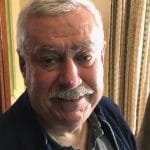
Dominique PLANTAZ
Dominique Plantaz MD, PhD University Hospital Centre of Grenoble-Alps University of Grenoble-Alps
Pr/Dr Dominique Plantaz has been involved in neuroblastoma cares and researches for thirty years.
He is internationally known for the different clinical and biological works. As member of the French Neuroblastoma Committee of the French Society for Pediatric Oncology, he was mainly involved in the field of particular aspects such as intra-spinal invasion diagnosis and treatment of this tumor, long term follow-up and congenital neuroblastomas.
Considering biological aspects of research, he performed in 1995 early studies using Comparative Genomic Hybridization (CGH) technique in San Francisco (UCSF) and Grenoble (University Joseph Fourier) laboratories; Further developments of CGH allowed this analysis to become a standard of biological characterization of neuroblastic proliferations in the routine practice, with still current utilization around the world.
As member of the SIOPEN group, he actively participated in the different trials and studies proposed for the different risk groups, particularly for high risk neuroblastomas (HRNBL trials); He was a member, for some years, of the Executive Committee of the SIOPEN group and he is still Principal Investigator in France for 2 international studies, the spinal cord invasion registry and the LINES supra-renal congenital masses (diagnosed antenatally or before the first three months of life).
He is still involved in care, leading the Pediatric Immuno-Hemato-Oncology Unit of Grenoble. He teaches Pediatrics and Pediatric Oncology. He is involved in the field of Pediatric Hemato-Oncology in Developing Countries such as Vietnam and Brazil and would be interested to bring his knowledges in Africa.
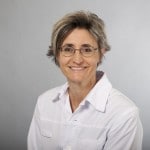
Fabienne GUMY-PAUSE
Dr Fabienne Gumy-Pause is hemato-oncologist at the University Hospital of Geneva, Switzerland. Genève, Hôpital Universitaire Genevois
Dr Fabienne Gumy-Pause is a Swiss paediatrician and onco-haematologist with more than 20 years of experience in clinical and translational research. She is actively involved in many national and international collaborative projects and is the principal investigator in several different clinical trials currently under way at the Geneva University Hospitals.
She is particularly involved in the treatment of solid tumours, fertility preservation and long-term patient follow-up. She has been heading the CANSEARCH Research Laboratory’s Oncogenetics Group since 2011.
The Oncogenetics Group has a long history of research in the field of childhood cancers. In recent years, their main research project has focused on the roles of different tumour suppressor genes in neuroblastoma, particularly those involved in responses to DNA damage. The oncogenetics group was able to identify the ATM gene as a haploinsufficient neuroblastoma suppressor gene, possibly involved in the aggressiveness associated with 11q deletion.
More recently, it identified PRIMA-1MET—a molecule more commonly known for its direct activation of mutated p53—as a promising new therapeutic agent that inhibits neuroblastoma cell growth and kills cells rapidly. The current objective of the group is to continue exploring PRIMA-1MET’s potential as a neuroblastoma treatment, either alone or in combination with other agents, as well as further investigating the molecular pathways involved in cellular response to PRIMA-1MET.
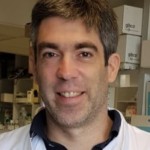
Didier SURDEZ
Didier Surdez studied pharmacy and graduated at the University of Basel (Switzerland).
He then moved to Ecole polytechnique fédérale de Lausanne, EPFL (Switzerland) and focused on the identification and characterization of hematopoietic and neural stem cells using murine transgenic models and obtained is PhD in 2007.
After a post-doc in Olivier Delattre laboratory at Institut Curie in Paris (France), he was appointed in 2014 as senior scientist in this laboratory. During this period, he has focused his research most on Ewing sarcoma aiming at deciphering biological processes driving oncogenesis through molecular, genetic, epigenetic and bioinformatics approaches.
He has highlighted key EWSR1-FLI1 targets (PRKCB), vulnerabilities (PARPi) and secondary alterations (STAG2) in this cancer. Since 2012, he is also actively involved in ancillary studies of EEC (EE2012, rEECur) and Combinair3 clinical trials with the aim of identifying predictive biomarkers in Ewing sarcoma.
In addition, he is currently developing several fundamental and translational research projects focusing on pediatric tumors. With the idea of developing most relevant models to address key questions around tumor heterogeneity, plasticity and to identify novel therapeutic strategies, he has established with his team a large collection of PDX models of pediatric solid tumors (including Ewing sarcoma, neuroblastoma, rhabdoid tumor, osteosarcoma and RMS PDX models).
In parallel, he is currently deciphering the function of STAG2 mutation in Ewing sarcoma and investigating more particularly how loss of STAG2 affects the three-dimensional chromatin folding and participate to Ewing sarcoma oncogenesis.
As of march 2021, he was appointed assistant professor at the University of Zurich (Switzerland) and his laboratory will continue to focus on basic and translational research to fight against pediatric tumors.

Valérie COMBARET
Manager of the transfer Research for the neuroblastoma in Centre Léon Bérard, Lyon-France
Neuroblastoma is a biologically very heterogeneous tumor with a clinical manifestation ranging from spontaneous regression to highly aggressive metastatic disease.
The activities of our team focusses on the molecular characterization of neuroblastoma specific genetic alterations by analyzing tumor, metastatic samples and circulating tumor DNA (ctDNA) in the cell free DNA (cfDNA) extracted from plasma.
Our team has demonstrated the feasibility of the study of ctDNA and shown ctDNA may overcome issues of tumor heterogeneity and detect rare mutations which might not be identified by studying a single site of disease.
Moreover, the analysis of ctDNA at different steps of the disease is also used to assess of residual disease and the clonal evolution during the treatment.
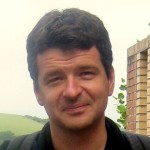
Florent GUERIN
Professeur des universités-Praticien hospitalier : Service de Chirurgie Pédiatrique, Pr Branchereau, CHU Bicêtre, Le Kremlin Bicêtre
A. Recherche fondamentale
Inserm UMR-S1174 ; 1174 interactions cellulaires et physiologie hépatique ; Université Paris-Saclay. (Directeur Thierry Tordjmann)
Thème de recherche sur l’étiologie de l’apparition de tumeurs hépatocellulaires dans les dérivations porto systémiques
Encadrement de 3 Mastères 2 : Mathilde Wagner (CHU Pitié Salpêtrière), Antoine Linné (CHU de Reims) ; Ongoly Okiemy (CHU de Reims) : Résultats Obtenus
Guérin F, Wagner M, Linné A, Fasseu M, Legagneux J, Zappa M, Van Beers B, Moreau R, Létteron P
HEPATIC PROLIFERATION AND ANGIOGENESIS MARKERS ARE INCREASED AFTER PORTAL DEPRIVATION IN RATS. A STUDY OF MOLECULAR, PATHOLOGICAL AND RADIOLOGICAL CHANGES. PLOS ONE 2013 (article et Mémoires pour A. Linné et M. Wagner)
PROLIFÉRATION ET RÉGÉNÉRATION HEPATIQUE SUR UN MODÈLE MURIN D’ANASTOMOSE PORTO CAVE CONGÉNITALE (Mémoire Dr Okiemy)
Ce projet est en collaboration avec :
• Laboratory for Functional and Metabolic Imaging (LIFMET), Center for Biomedical Imaging (CIBM). Ecole Polytechnique Fédérale de Lausanne (EPFL), Suisse.
• Inserm-UMR 1149, Centre de Recherche sur l’Inflammation, Faculté de Médecine Xavier Bichat, Université Denis Diderot-Paris 7, Paris
Projet en cours :
Caractérisation moléculaire des nodules développés sur fistule portocave congénitale : Collaboration avec le Laboratoire d’anatomopathologie de Bicêtre, Pr Catherine Guettier et le laboratoire de biologie moléculaire de Paul Brousse, Pr Antoinette Lemoine.
B. Recherche clinique :
1. Fistules portosystémiques congénitales
Dans le cadre du CRMR maladie vasculaires du foie, filière Filfoie
Résultats obtenus :
Classification anatomique et voie d’abord chirurgicale (Blanc et al. Ann surg 2013)
Résultats sur les premiers cas de fermeture de Bicêtre (Franchi et Al. JPGN 2012)
Plusieurs revues de la littérature sur le sujet (Bernard et al. Guérin et al. Seminars of Pediatric Surg)
Établissement des recommandations du protocole national de soins : maladies rares, maladie vasculaire du foie.
Projets en cours
Constitution et participation au « steering comitee » du registre international de fistules portocaves congénitales (IRCPSS), collaboration avec les hôpitaux universitaires de Genève.
Travail en cours sur la corrélation e avec le type anatomique de fistule portocave congénitale et les anomalies congénitales associées (Dr Julie Lienard CCA NANCY)
2. (Rhabdomyo) sarcomes
Membre du commité chirurgie European pediatric soft tissue sarcoma group(EpSSG) et Commité MMT de la SFCE (mesenchymal malignant tumours), membre du comité neuroblastome et SIOPEN.
Rhabdomyosarcomes vessie prostate :
Publications sur les très bons résultats du traitement combinant chirurgie et curiethérapie (survie 90% et survie sans récidive 80%) (Chargari et al 2017)
Transposition testiculaire pour radioprotection dans le cadre de la combinaison chirurgie curiethérapie pour les rhabdomyosarcomes vésico prostatiques (De Lambert et al 2017)
Projets en cours :
Séquelles urologiques à long terme (Dr Akkary, Bicêtre, écriture en cours, abstract SFCP)
Séquelles testiculaires de la transposition (Dr Scarvaglieri, Montpellier, abstract en soumission IPSO)
Rhabdomyosarcomes voies biliaires :
Publication EpSSG sur le résultat des RMS des voies biliaires, bon pronostic donc site favorable désormais, récidives graves, pas de différence entre chirurgie et radiothérapie mais effets à longs termes en faveur de la chirurgie. (Guerin et al 2018)
Projet en cours :
Étude EpSSG Sarcome embryonnaire du foie : étude et influence du traitement local sur les résultats oncologiques.
Mémoire du DIUOP en collaboration groupe MMT et EpSSG
3. Autres Tumeurs :
a. Tumeurs neurogènes et thoracoscopie (Dr Lecomte Nice)
b. Neuroblastomes médians (Dr Ali, Robert Debré, Paris)
c. Tumeurs ovariennes étude île de France (Dr Iaquinto, Bicêtre)
4. Autres projets en hépatologie
Lithiases de la voie biliaire principale (Dr Iaquinto , Dr Scarvaglieri, Montpellier)
Atrésie des voies biliaires :
• AVB et prématurité
• AVB de diagnostic anténatal
• En cours de développement :
o Intérêt de la caméra au vert d’Indocyanine dans l’atrésie des voies biliaires
o Expression des molécules de l’immunité dans le sang portal des patients atteints d’atrésie des voies biliaires.
Transplantation hépatique :
Complications biliaires en transplantation hépatique pédiatrique facteurs influençant la dilatation radiologique et résultats sur la survie du patient et du greffon. (Dr Calinescu, hôpitaux universitaires de Genève)
En savoir plus sur le conseil Scientifique par le Dr. Jean Michon, ex-président du conseil
Le conseil scientifique
Présentation du Dr Jean Michon
Dr Jean Michon, Ex-Président de la Société Française du Cancer de l’Enfant SFCE et fondateur du comité scientifique « l’association Hubert Gouin – Enfance & Cancer » en 2004.
Président jusqu’en 2020.
